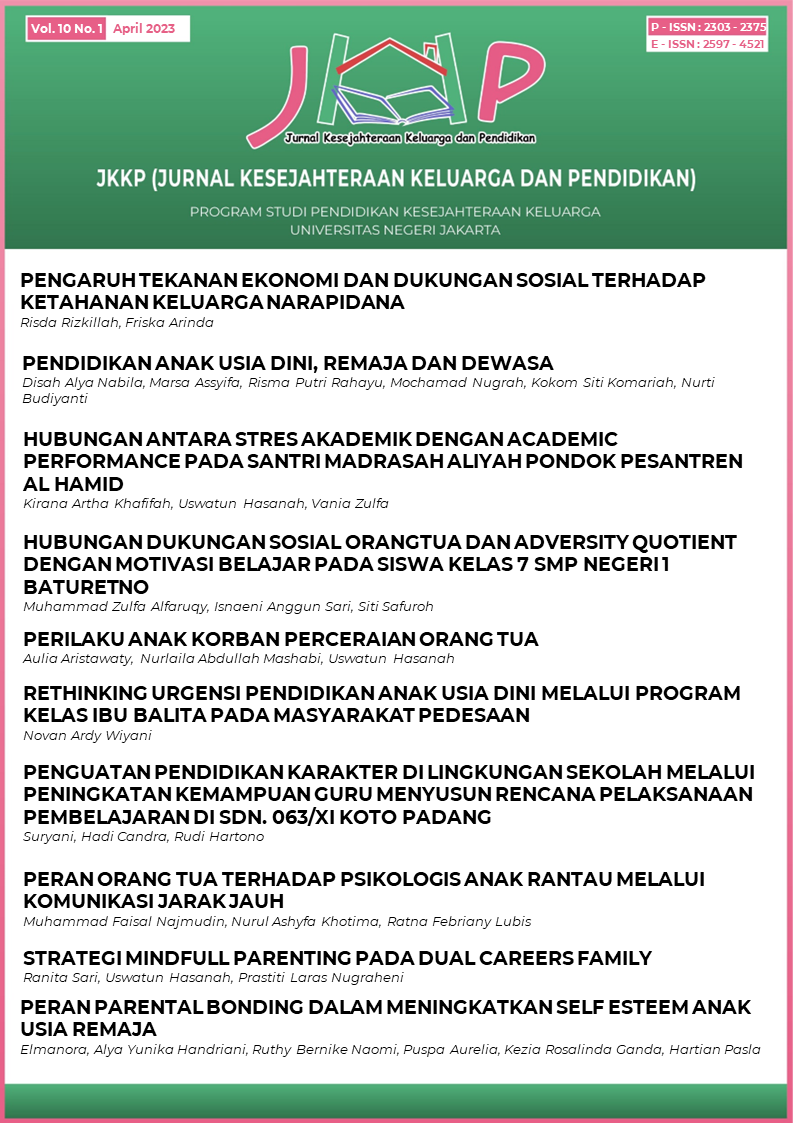PERILAKU ANAK KORBAN PERCERAIAN ORANG TUA
DOI:
https://doi.org/10.21009/JKKP.101.05Keywords:
anak usia dini, masalah perilaku, perceraianAbstract
Abstrak
Kasus perceraian yang tinggi khususnya di daerah Jakarta Timur dikhawatirkan akan berdampak pada perilaku anak korban perceraian orang tua yang dapat menjadi bermasalah. Penelitian ini bertujuan untuk mengidentifikasi perilaku anak korban perceraian orang tua. Penelitian dilakukan di Jakarta Timur pada bulan Oktober 2022 sampai dengan bulan Februari 2023. Penelitian ini menggunakan metode kuantitatif deskriptif. Pengambilan sampel menggunakan teknik purposive sampling. Sampel dalam penelitian ini adalah orang tua yang bercerai yang memiliki anak usia dini yang tergabung dalam komunitas orang tua tunggal sebanyak 100 responden. Data diperoleh menggunakan kuesioner. Instrumen yang digunakan untuk mengukur masalah perilaku adalah The Child Behavior Checklist and Related Forms for Assessing Behavioral/Emotional Problems and Competencies (CBCL). Kuesioner yang digunakan memiliki 58 pernyataan setelah diuji validasi dengan dimensi reaksi terhadap emosi, kecemasan/depresi, keluhan somatik, menarik diri, masalah tidur, kesulitan berkonsentrasi, dan perilaku agresif. Data diolah dan dianalisis dengan menggunakan teknik analisis statistik deskriptif dan analisis korelasi (chi-square). Hasil penelitian menunjukkan bahwa masalah perilaku anak usia dini yang orang tuanya bercerai berada di tingkat sedang dengan nilai rata-rata 41,54. Hasil juga menunjukkan bahwa tidak terdapat hubungan antara karakteristik responden, yaitu jenis kelamin anak, usia anak, pekerjaan ayah, dan pekerjaan ibu dengan masalah perilaku anak, sedangkan, terdapat hubungan antara orang tua yang mengasuh dengan masalah perilaku anak. Hasil ini berarti anak usia dini yang orang tuanya bercerai memiliki sedikit masalah perilaku yang akan muncul jika terdapat suatu hal atau kejadian yang tidak disukai anak sehingga akan memicu masalah perilakunya.
Abstract
The high number of divorce cases, especially in the East Jakarta area, is feared to have an impact on the behavior of children who are victims of parental divorce which can become problematic. This study aims to determine the behavior of children who are victims of parental divorce. The research was conducted in East Jakarta from October 2022 to February 2023. This research uses the descriptive quantitative method. Sampling using a purposive sampling technique. The sample in this research is divorced parents who have early childhood and are members of a single-parent community of 100 respondents. Data were obtained using a questionnaire. The instrument used to measure behavioral problems is The Child Behavior Checklist and Related Forms for Assessing Behavioral/Emotional Problems and Competencies (CBCL). The questionnaire used has 58 statements after being validated with the dimensions of emotionally reactive, anxiety/depression, somatic complaints, withdrawn, sleep problems, attention problems, and aggressive behavior. Data were processed and analyzed using descriptive statistic analysis techniques and correlation analysis (chi-square). The results showed that the behavioral problems of early childhood whose parents divorced were at a moderate level with an average value of 41.54. The results also show that there is no relationship between the characteristics of the respondents, such as the child's gender, the child's age, the father's occupation, and the mother's occupation, with the child's behavior problems, meanwhile, there is a relationship between the characteristics of the parent who nurtures the child and the child's behavior problems. This result means that early childhood whose parents are divorced have few behavioral problems that will arise if something or an event triggers it.
Downloads
Published
Issue
Section
License
Copyright (c) 2025 Aulia Aristawaty, Nurlaila Abdullah Mashabi, Uswatun Hasanah

This work is licensed under a Creative Commons Attribution-ShareAlike 4.0 International License.
Authors who publish with this Journal agree to the following terms:
- Author retain copyright and grant the journal right of first publication with the work simultaneously licensed under a creative commons attribution licensethat allow others to share the work within an acknowledgement of the work’s authorship and initial publication of this journal.
- Authors are able to enter into separate, additional contractual arrangementfor the non-exclusive distribution of the journal’s published version of the work (e.g. acknowledgement of its initial publication in this journal).
- Authors are permitted and encouraged to post their work online(e.g. in institutional repositories or on their websites) prior to and during the submission process, as it can lead to productive exchanges, as well as earlier and greater citation of published works.
Users/public use of this website will be licensed to CC BY SA
![]()







